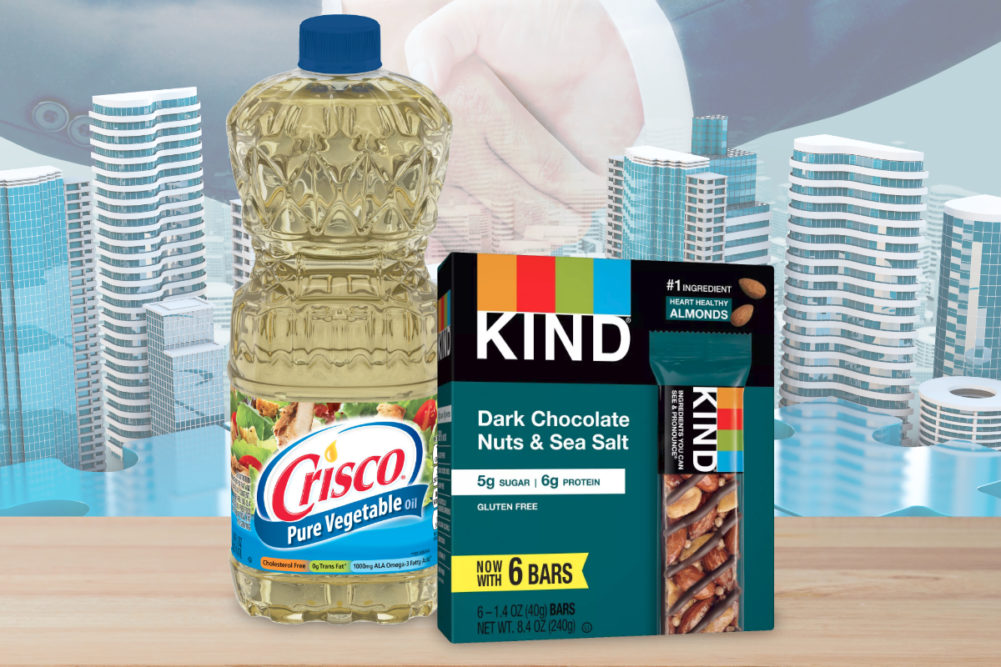NEW YORK — Mars, Inc.’s acquisition of Kind Healthy Snacks and J.M. Smucker Co.’s divestiture of its Crisco oils and shortenings business to B&G Foods, Inc. are “just the beginning of a portfolio reshaping ‘revival’ in the food sector,” according to a new research report from Credit Suisse.
In the Dec. 4 report, analyst Robert Moskow identified four key factors potentially driving the shift in strategy.
First, the coronavirus (COVID-19) pandemic has provided a shot of adrenaline to major food and beverage companies’ balance sheets that has increased their financial flexibility.
Second, management teams are expressing a desire to either shift the weight of their portfolios toward higher-growth segments or divest slower growth brands. Battle Creek, Mich.-based Kellogg Co. is among the companies eyeing higher-growth segments, and in the third quarter it launched Kellogg Morningstar Farms meat alternative sub-brand Incogmeato and Disney-shaped nuggets, marking the first child-oriented offering in the plant-based category. Meanwhile, J.M. Smucker Co., Orrville, Ohio, on Dec. 4 announced plans to divest its Natural Balance premium pet food business to Nexus Capital Management LP for $50 million, just a few days after completing the sale of its Crisco oils and shortenings business to B&G Foods for $550 million.
Mr. Moskow said Credit Suisse has reviewed more than 30 independent companies, analyzing the pros and cons for consolidation.
“We put a relatively high probability on a takeout of Hain Celestial Snacks ($300 million in sales) and Simply Good Foods ($900 million in sales) owing to consolidation trends in the snack category and the relatively ‘un-entrenched’ nature of the ownership,” he said. “We also highlight private companies Amy’s Kitchen ($500 million in sales) and Herr’s Foods ($185 million) as highly attractive assets, but we have assigned lower probability because of their family ownership and independent mindset.”
A third factor at play is subdued valuations for “Big Food” companies, which Mr. Moskow said indicates continued market skepticism about whether these companies’ portfolios can maintain positive sales growth once consumers regain their mobility.
Valuation, he said, is a significant obstacle for acquisitions, especially in plant-based foods, which has emerged as the fastest-growing segment of the food market due to dietary changes and rising awareness of the livestock industry’s impact on the environment.
“We expect the big food companies like Tyson, Hormel, Conagra, Kellogg, and Unilever to strike a balance between extending their existing brands and making small tack-on acquisitions to expand their presence rather than try to make a bid for the market leaders,” Mr. Moskow said. “Beyond Meat, Freshpet, and Impossible Foods represent a major stretch for even the most long-range thinking big companies given estimated valuations in the range of 10-12x next year’s sales.”
Finally, a portfolio reshaping revival may be ahead due to the fact companies probably can fetch better-than-normal valuations for the slower-growth brands in their portfolios that benefited from stronger sales during the pandemic, Mr. Moskow said.
“Conagra might consider divesting some of its $1 billion of refrigerated brands given its lack of scale in the refrigerated aisle and because it has a tax asset of $680 million to offset capital gains that expires in FY ‘21,” he said. “It also may consider exiting some of its canned goods brands. Kraft Heinz might sell its coffee business (now that it has exited its distribution partnership with McDonald’s) and its Italian infant feeding business Plasmon, both of which were reported as potentially up for sale by Reuters in 2019. The downside to these transactions is that most divestitures would cause EPS dilution.”





